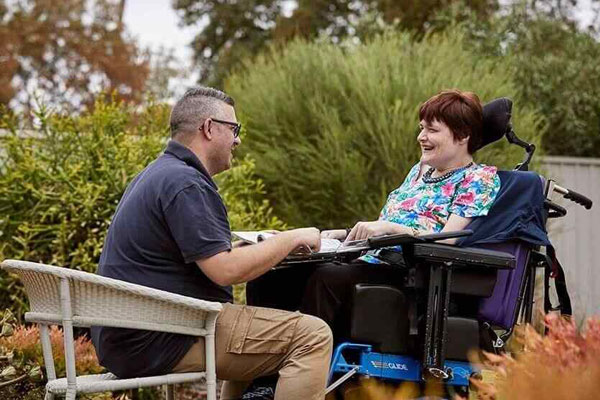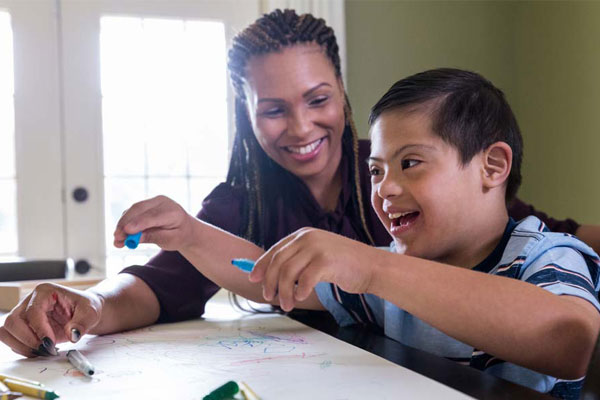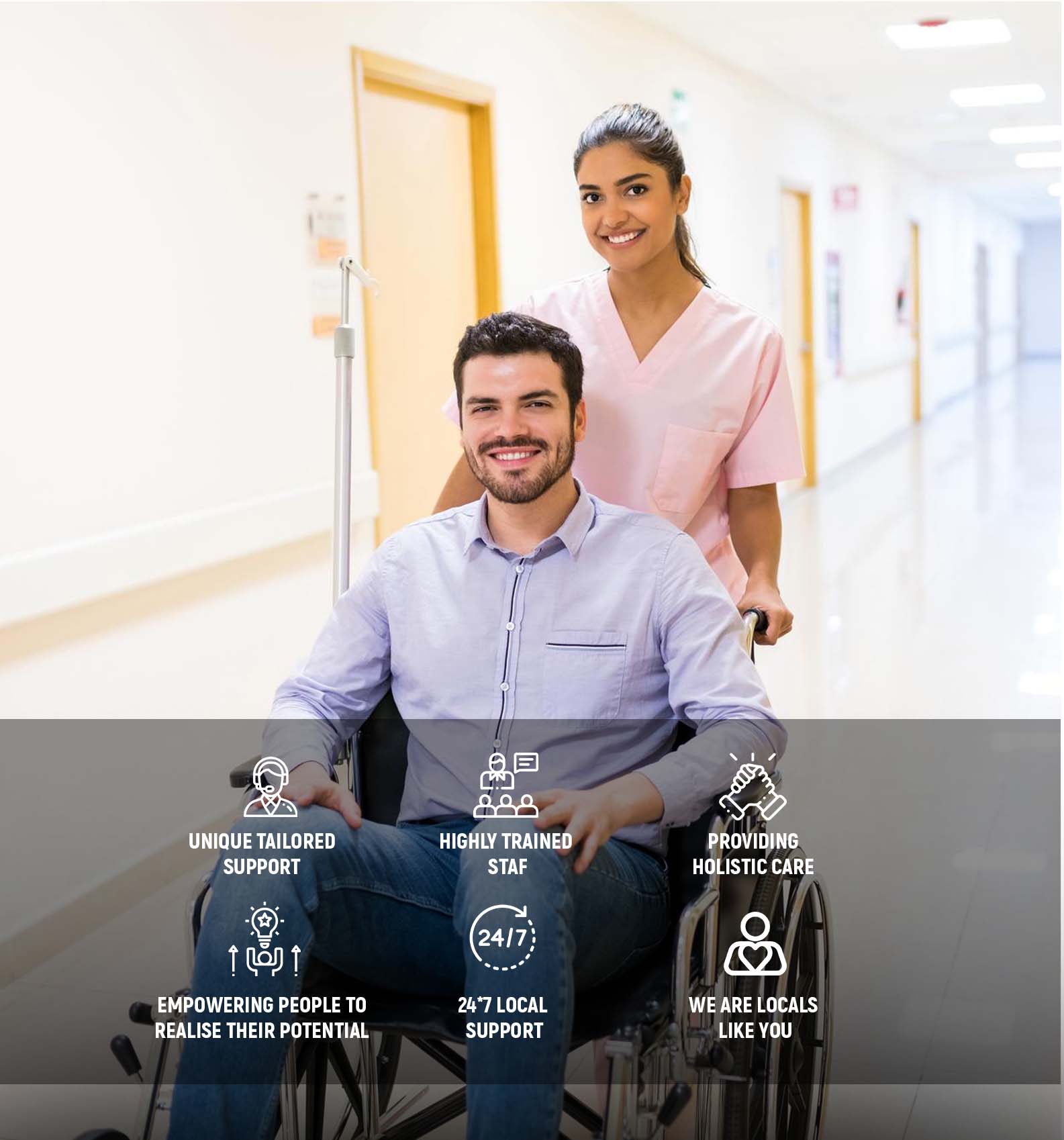NDIS Perth
What is the NDIS?
The NDIS is an Australian scheme that gives people with permanent disabilities the opportunity to live more independent lives. It provides funding and support for those who have what is defined as a significant physical or mental disability, challenge as well as intellectual impairment. The NDIS provides financial assistance to those who’s impairment prevents them from carrying out day-to-day activities. Eligible individuals can vary greatly depending on the severity of their disabilities, with this determining what funds are granted by NDIA (NDIS).

NDIS- what does it mean?
- N – National
A scheme accessible and available Australia-wide, The NDIS is national.
- D – Disability
Support through the NDIS is provided to individuals in Australia who live with an intellectual, physical, sensory, cognitive and psychosocial disability. Furthermore, early intervention supports is also available for eligible people with disability or children with developmental delay.
- I – Insurance
As an added peace of mind, the NDIS has insurances in place to ensure that those born or impacted by a significant disability or impairment will get the support they need.
- S – Scheme
Not set up as a welfare system. the NDIS is designed with longevity in mind, helping people get the support they need so their skills, and independence improve over time.


What does the NDIS do?
According to https://www.ndis.gov.au, National Disability Insurance Agency (NDIA) is an independent statutory agency. NDIS role is to implement the National Disability Insurance Scheme (NDIS), which will support a better life for hundreds of thousands of Australians with a significant and permanent disability and their families and carers.
The NDIS is an innovative new disability scheme and solution that will revolutionise how we deliver the needs of those who are differently abled. For years, Australia has been stuck in an outdated system where people with disabilities were given block funding from agencies or community organisations. Now, they’ll be able to receive their necessary supports straight away through one single program: The National Disability Insurance Scheme (NDIS). With more than 4 million Australians living. The NDIS also provides people with disability, including those not eligible for funding, with information and connections to services in their communities.
This includes connections to doctors, sporting clubs, support groups, libraries and schools, as well as providing information about what support is provided by each state and territory government.
Who is eligible to apply for the NDIS?
A set framework, guided by the NDIS, this scheme has strict guidelines on who is eligible to access the funding available to participants. The scheme says that you must be…
- An Australian citizen
- Below 65 years of age
- Live with a permanent, lifelong disability that prevents you from independence, including the ability to do everyday tasks
- Using special equipment due to you permanent and significant disability
While those who suffer from progressive neurological diseases may think they aren’t eligible for the scheme, it would be advisable to go through the criteria list to ensure you are eligible. Some patients may need early intervention access to the NDIS if they have evidence that getting support now will help them reduce their support needs in the future.
It is also important to note that some patients may be eligible if they need physical or mental support to carry out their daily tasks.
Chat to the team at Compass Care Group for us to help you understand your eligibility today.

How to apply for the NDIS?
To access the NDIS in Western Australia, you will need to complete an application. Once your paperwork has been submitted it can take up two weeks for approval or rejection by email unless there are any issues with eligibility status on behalf of yourself, which would require more stringent conditions before they allow participation within the scheme.

What will I need to provide in my application?
Firstly, you will need to make an access request. You can do this by calling the NDIS on 1800 800 110 to make an access request or you can complete and submit the access request form via email.
Secondly, as part of the access request process, you will be asked:
- To confirm your identity and/or a person’s authority to act on your behalf
- To answer questions to see if you meet the NDIS access requirements (age, residence and disability)
- Questions about providing consent to enter the NDIS and about seeking information from third parties.
When providing details and reports about your medical records, you can either submit reports provided by your physician or provide permission for the NDIA to talk to other people about your disability, including your local
doctor or a person providing support to you.
When you apply, the NDIA will send you a letter asking for any further evidence, if required.
For this, you can ask your treating health professional to complete the Supporting Evidence Form available
at ndis.gov.au Be sure to send your evidence to the NDIA via email, NAT@ndis.gov.au or mail, GPO Box 700, Canberra, ACT 2601. Alternatively, you can provide it in-person by taking it to your local office. We advise you keep a copy of your evidence for your own records.
Be sure to also provide details and evidence about your disability and how it impacts you each day.
If you need any help in going through the application process, do not hesitate to contact us, we are NDIS professionals who can help you.
Which support and services are funded by the NDIS?
The following are inclusive but not limiting:
- Help with household tasks to allow the participant to maintain their home environment
- Help to a participant by skilled personnel in aids or equipment assessment, set up and training
- Home modification design and construction
- Mobility equipment, and vehicle modifications
- Day-to-day personal activities
- Transport to enable participation in community, social, economic and daily life activities
- Workplace help to allow a participant to successfully get or keep employment in the open or supported labour market
- Therapeutic supports including behaviour support


What if I need help to apply for the NDIS?
After reviewing the criteria, if you are eligible for an NDIS plan, you can have a conversation with us to learn about your current situation, supports, and goals to help develop your plan.
Someone from the NDIA will be required to review and approve your plan. Chat to our team at Compass Care Group today, we will go through the right measures to see you have a successful application, if you are eligible to receive the NDIS funding you rightfully deserve.

Which support and services are funded by the public health systems?
Services provided by the WA Government include,
- Access to public hospitals
- Access to mental health services
- Access to general dental health services
- Access to population health services
- Access to community health centres, and health promotion services.
What NDIS and other government services responsible for?
Other government services to help alleviate day-to-day necessities for Australians who live with a disability. We have curated a list of supports the NDIS will and will not fund, to help you better understand what the government will help you with. We have separated this section into education, health, employment and family support.
Education
What will NDIS likely to fund? Or What NDIS is responsible for?
- Offering self-care at school with all aspects related to the student’s disability.
- Specialised training of school staff to better equip them to attend to the specific needs of the student with a disability.
- Transport supports to help with the student’s disability.
- Transportable equipment such as a wheelchair or personal communication devices.
- Delivery of therapies that come other the bracket of non-education that a family and school have agreed may be delivered during educational hours at school.
Education systems fund – What supports NDIS would not fund?
- The actual teachers, educational assistants and other educational assistance like AUSLAN workers.
- The general and main-stream support, resources and training for teachers, tutors and other staff that do not fall under the bracket of disability.
- The allied health practitioners that deliver therapy schools for educational purposes.
- Any assistance, aids and equipment to make the educational curriculum accessible to all students This can include modified computer hardware,software and braille textbooks.
- Adjustments to buildings such as ramps, lifts and hearing loops.
- The transportation required to deliver educational or training activities such as school field trips, excursions and sport carnivals.
- The daily supervision of students at school.
Health
What will NDIS likely to fund? Or What NDIS is responsible for?
- The necessary home modifications, personal care and development of skills to assist in your independence.
- Any allied health and outlined therapies that are needed because of your disability.
- The actual prosthetics and artificial limbs to enable your independence.
- Assistive technology like wheelchairs, adjustable beds or hearing aids to enable independence.
- Various therapeutic and behavioral supports for people with psycho social disability.
Public health systems fund- What supports NDIS would not fund?
- The actual diagnosis and official medical assessment of health conditions, that encompass mental health and disabilities.
- The prescription of medication. This can include, general medical and dental services and treatment, specialist services, hospital care, surgery and rehabilitation.
- All-inclusive clinical care for mental health conditions, palliative care, geriatric and psychogeriatric services.
- Nursing services delivered for all sub-acute, rehabilitation and post-acute care.
- Transitional services from hospital back to home, and vice-versa.
- Hearing, and vision services that an individual needs help in, and is not part of the person’s general disability.
Employment
What will NDIS likely to fund? Or What NDIS is responsible for?
- The personal care needs that enables a participant to participate in their profession.
- The necessary aids, assistance and equipment such as wheelchairs or personal communication devices to enables a participant to work.
- The transitional needs that can be expected for a person living with a disability, that is beyond what is reasonable for an employer to provide.
- Supports in individual and group-based capacity building to assist participants to build work confidence and essential work skills. This falls outside what is reasonable for an employer to provide.
- Keeping a participant’s skill’s sharp, the NDIS provides ongoing on-the-job support where a participant is likely to need higher intensity or more frequent supports in the workplace.
Employers and employment services fund – What supports NDIS would not fund?
- Access and support by agency bodies like Disability Employment Services or Job-Active, to help with getting participant’s job ready.
- Workplace-specific supports including building modifications, employment-specific aids and equipment such as computers and modified desks.
- The transport of a participant to meet workplace KPIs and activities, such as attending work meetings or making work appointments.
Family Support
What will NDIS likely to fund? Or What NDIS is responsible for?
- Disability-specific supports and training programs needed because of the impact of a child or parent’s disability.
- Out-of-home care for children, teenagers and adults needing disability support. These can include, home modifications, equipment, therapies and behavioral support, and the development building activities to grow a child’s independence.
Community and government family services fund – What supports NDIS would not fund?
- Any child protection issues, as expected for children without a disability.
- Education through providing information and awareness to the community regarding child safety and well being.
- The necessary counselling, parenting skills programs and family relationship services are made accessible to the participant(s).
- Out-of-home care for children, teenagers and adults–including housing, care allowances, payments and other standard supports to sustain the arrangements.
- Family Tax Benefit or Child Care Rebates, and any other family tax benefits.
How do I find a registered NDIS service provider?
To find an NDIS registered service provider, a person can reach the NDIS website and search in the ‘Provider Finder’ section of the Myplace portal. One can submit his state or territory and postal code to find the right candidate nearby. The candidate’s name, address, contact details and other required information will be available in the section.
- Check the provider’s licence – NDIS providers should be licenced, insured and bonded. Ensuring your chosen provider is legitimate and has the necessary qualifications is vital. One way to do this is by checking for essential documents that show they meet and comply with the NDIS Practice Standards and Code of Conduct. These documents give you peace of mind that you’re working with a trustworthy insurance provider.
Verify your care provider’s credentials on the NDIA website or by reaching them directly to ensure high-quality care and avoid forgery or substandard services.
- Consider their qualification and experience – Always look for an experienced NDIS provider who has been serving people with disabilities for a long time. This ensures they are knowledgeable and familiar with current care practices.
To ensure you choose a reputable care provider, you can always ask for references from previous clients. This will give you an idea of their quality of service and experience in providing exceptional care.
- Ask about their value proposition, deal and other offers – Choose an NDIS service provider that aligns with your needs by understanding their value proposition and areas of expertise. The value proposition is a statement that outlines the process of working for the NDIS provider. It defines what the provider does, how they do it and who they do it for.
When searching for a provider, ask about their value proposition to learn what they offer and their level of dedication. Find a provider that aligns with your requirements by asking questions.
What is Carer's Statement?
The NDIS Carer Statement is developed to inform a representative from the NDIA (National Disability Insurance Agency) about the core information regarding the care that is given by a carer for their loved one. It is considered an essential part of the application for an NDIS.
Some crucial aspects of the Carer Statement are
- The standard and easiest way for carers and families to ask the NDIS what they need as participants is to write a carer statement and give it to the NDIS planner.
- The Carer Statement is an essential opportunity for you to share your unique story and help your NDIS planner fully comprehend the support required for your loved one. In this statement, you can describe the care and support you deliver and its impact on you and other family members.
- It is essential to be fair about which tasks you are able and willing to continue to provide and which tasks you need assistance with and should be included in the NDIS Plan. By outlining your needs and priorities, you can help ensure your loved one receives the right level of support through the NDIS.
The NDIS support will help maintain a beneficial and well-functioning home environment for your loved one. Your input is crucial to developing a personalised and effective NDIS Plan.
Before selecting any NDIS Registered support service provider in Perth, there are a few questions you should ask.
- Does the provider give the supports you require?
- What qualifications and abilities do their employees possess?
- Do the providers’ prices seem reasonable?
- Can the suppliers ensure that the strategy is flexible?
A person should ask these and other questions before selecting a support service provider. The selection of registered NDIS services Perth is supervised by the National Disability Insurance Agency (NDIS). The organization takes steps to ensure that the service providers are capable of offering the participants high-quality services.
Who can write a Carer's Statement?
The NDIS Carer Statement is developed to inform a representative from the NDIA (National Disability Insurance Agency) about the core information regarding the care that is given by a carer for their loved one. It is considered an essential part of the application for an NDIS.
Some crucial aspects of the Carer Statement are
- The standard and easiest way for carers and families to ask the NDIS what they need as participants is to write a carer statement and give it to the NDIS planner.
- The Carer Statement is an essential opportunity for you to share your unique story and help your NDIS planner fully comprehend the support required for your loved one. In this statement, you can describe the care and support you deliver and its impact on you and other family members.
- It is essential to be fair about which tasks you are able and willing to continue to provide and which duties you need assistance with and should be included in the NDIS Plan. By outlining your needs and priorities, you can help ensure your loved one receives the right level of support through the NDIS.
The NDIS support will help maintain a beneficial and well-functioning home environment for your loved one. Your input is crucial to developing a personalised and effective NDIS Plan.
A participant can write a carer statement and be provided by a family member or provider that supports and cares for a person with a disability. Their input may be valuable in conveying to the NDIS the level of support needed.
A carer statement can be provided when Someone provides care and support to a family member, friend, a loved one or in a professional way for mental illness, mental health condition or disability issues.
In the carer’s statement, one can write:
- The level of support you provide to your loved one suffering from a disability
- The period in a day or week the support is provided
- Any resources you use, like transport or disability-supporting devices
- Kind of assistance you need to deliver, like daily personal activities and household tasks, etc.
- Medication, monitoring and supervision you provide of the person with a disability.
- How you take care of the medical check-ups and appointments
- How do you assist with special food diets, regular cooking and other requirements
- The encouragement you provide to boost confidence
How Can I Write a Carer's statement?
The Carer’s statement can be an informal letter or a formal structured statement. Either way, it can be the information about the person you care for. You can write the following statements:
- Loved ones have a disability that impacts their day-to-day functioning.
- They need support with tasks such as getting dressed, preparing meals and managing medications. As their Carer, you assist with these tasks and also help to arrange medical appointments and transportation.
- As a carer, balancing caring for the loved one with your own needs can be challenging, but you try to priorities self-care and make time for your interests and hobbies.
- The caring role can be emotionally and physically demanding, but seeing the progress the loved one makes is rewarding. So, you are committed to caring in the future, but you recognise that their needs may change over time.
- This network is invaluable in helping loved ones keep their independence and quality of life.
- Overall, you want the NDIA to know that your loved one requires ongoing support to manage their disability. This support includes assistance with daily tasks, medical appointments, and transportation.
- With the proper help, your loved one can attain their goals and live a fulfilling life.
When writing a support letter for the National Disability Insurance Scheme (NDIS), it’s important to remember that the NDIA uses six categories of daily life in the assessment process. To ensure your support letter is effective, you’ll want to address all relevant types and use examples where possible.
A common approach is to go through each of the classes and explain the functional impact of each one for the applicant. This can help the NDIA better understand the applicant’s needs and determine the appropriate level of support.
Mobility/motor skills -.Public transportation can be overwhelming and stressful, especially during peak hours or crowded situations.
It is often challenging to risk outside due to safety concerns. Mobility hardships due to medication or effects of treatments, e.g. moving around the house, getting in or out of bed or a wheelchair, going out for groceries or daily requirements
Communication – Need help with understanding communication and instructions. It’s tough during conversations and expressing to seek help or directions. – Need help with understanding communication and instructions. It’s tough during conversations and expressing to seek help or directions.
Social interaction – Facing difficulties initiating an exchange, responding to a conversation, making or keeping friends, or participating in social or recreational activities.
Learning – Difficulty organising and planning any task, remembering or learning new information, participating or concentrating in group classes or focusing on complex tasks, understanding or remembering information, learning new skills or using new skills.
Self-care – Difficulty doing daily jobs, maintaining physical health, managing medication and wellbeing.
Self-management – Difficulty attending to responsibilities due to lack of inspiration, interest and concentration. It also affects doing daily jobs, making decisions, managing money or problem-solving.
Before selecting any NDIS Registered support service provider in Perth, there are a few questions you should ask.
- Does the provider give the supports you require?
- What qualifications and abilities do their employees possess?
- Do the providers’ prices seem reasonable?
- Can the suppliers ensure that the strategy is flexible?
A person should ask these and other questions before selecting a support service provider. The selection of registered NDIS services Perth is supervised by the National Disability Insurance Agency (NDIS). The organization takes steps to ensure that the service providers are capable of offering the participants high-quality services.
Why do you need a Carer's Statement?
The primary purpose of a Carer’s Statement is to detail how caring for your loved one with a disability can affect you and the lives of your family and how you are willing to deal with the condition with utmost positivity. It is used to support an NDIS (National Disability Insurance Scheme) application as it helps the NDIA (National Disability Insurance Agency) to determine the level of care needed.
A carer’s statement always helps when you go for an:
Access Request – It is recommended that an individual’s functional capacity be assessed before the scheme application or First Planning Meeting. This will provide priceless insight into the individual’s capabilities and limitations, allowing for a more effective and tailored plan to be developed. Gathering as much information as possible ensures the scheme’s success and the individual’s all-around well-being.
Plan Re-assessment – It was formerly known as ‘plan review’. It is necessary so that the plan’s funding wouldn’t potentially decrease. It gives a chance to perform an internal review, which offers an opportunity to assess the things submitted earlier.
Clear Statement – A written statement about the actual condition of your loved one with a disability and your contribution and challenges in dealing with the difficulties and the help needed to overcome the hardships is always helpful.
What are the benefits of writing a Carer's Statement on the NDIS plan?
A Carer’s Statement helps to strengthen the NDIS application because it provides a clear, practical picture of the needed support. It is often uncomfortable to write about the detailed struggles that you are going through. Still, it gives a clear vision of the NDIS regarding the funding and support you need for the person with a disability you care for.
The benefits of the Carer’s Statement on the NDIS plans are vast and stay a long way:
- The carer’s statement provides significant strength to the application for NDIS funding.
- It helps the NDIA decide the funding level they would provide for the person with a disability.
- It helps the NDIA to understand the challenges a primary carer faces while taking care of the participant of the NDIS scheme.
- You can more elaborately convey your needs regarding aid needed to walk along smoothly in the life journey with the participant.
- Suppose you are uncomfortable discussing the problems you face regarding your daily life, like maintaining your job and other commodities as a primary caregiver to a person with a disability. In that case, the NDIA can rethink increasing the fund through your carer’s statement.
- Detailed written documentation will provide a clear view of the NDIS, and you will be able to visualise the pathway and needs for taking care of your loved one with a disability lifelong.
How will the Carer's Statement be critical in increasing NDIS funds?
A Carer statement or Impact Statement is a written letter by Someone who cares and spends time with an individual with a disability. It describes in depth how the disability of the person impacts them and the lives of those involved in the care and treatment.
Including details about daily struggles in an NDIS application can confirm the level of care needed for a better quality of life. Describing obstacles the individual and their loved ones face provides insight into their unique circumstances, which can help define the necessary level of care.
A Carer statement can be an excellent support for increasing the NDIS funding. You will need to describe your problems and needs as precisely as possible:
- Describe the help you need while taking care of an individual with disabilities
- How much cost is involved in the process of taking care of the participant of NDIS.
- Describe the emotional impact that can sometimes occur
- How it affects the daily life of the person with a disability and yourself
NDIS measures eligibility through ‘Functional Capacity’, so mentioning the ‘functional capacity ‘of the applicant and how their life is affected in the six domains (communication, learning, social interaction, mobility, self-care and self-management) of life is crucial.
Carer's statement letter
To
The NDIA
Concerning the application of – Mary Smith
Name of the primary Carer – John Smith
Relationship to NDIS applicant – Primary Carer and father
Hello,
My name is John Smith.
I am writing this carer statement in support of my daughter Mary Smith’s NDIS application.
In this application, I am describing Mary’s support needs, how much time I spend supporting her daily, the impact on me as a carer, and how she will benefit from additional support from the NDIS. Mary’s official diagnosis is ‘ Bilateral perisylvian polymicrogyria and ataxia and spastic cerebral palsy left hemiplegia with dystonia and clonus’.
I am 45 and a single father. Mary is now eight and an active, vibrant girl who requires assistance in her daily activities. As a parent, I am constantly at her side. Her coordination and balance need support to avoid falls and injury, along with typical parenting responsibilities.
I work full-time and face challenges, requiring constant days off due to appointments and therapies. She also needs a regular massage at night as her legs are in pain. I am the only supporter in her life as her mother left us two years back.
The condition of Mary is impacting her daily life in many ways, whether it is mobility, social interaction, learning, self-care, self-management or communication. Her mobility is disturbed due to her problem of accessing anything independently. She is almost silent and does not communicate. Though she is an intelligent child, her learning, communication and social interaction are still affected. Proper support and understanding of the NDIA funding procedure can make her situation more helpful.
Mary is lovely and kind-hearted, but her physical limitations have made things hard for the last few years. The condition affects her strength, memory and auditory processing.
Mary can move, and a school wheelchair is provided for her to use when she is tired. She needs rails when walking up and down stairs and moves much slower. Mary goes to mainstream school and loves interacting with her peers. She tries so hard, and I am so proud of her perseverance.
Since the onset of the pandemic and the loss of face-to-face therapy and school, Mary’s muscles have weakened considerably, and we have observed a significant regression in her condition. Although the treatment supports she currently receives are insufficient to help Mary maintain her strength and progress.
As a single father, all Mary’s needs fall onto my shoulders. I work full-time to support my family, but I must also ensure she can attend all therapy appointments. It’s challenging without any family help, but I’m determined to find a way to make it work. Adding extra care is necessary to ensure that Lucy can live a happy and independent life. I also need to be able to take care of my mental health. I hope that the needs of my daughter and me as her Carer will be considered.
Regards
John Smith
Before selecting any NDIS Registered support service provider in Perth, there are a few questions you should ask.
- Does the provider give the supports you require?
- What qualifications and abilities do their employees possess?
- Do the providers’ prices seem reasonable?
- Can the suppliers ensure that the strategy is flexible?
A person should ask these and other questions before selecting a support service provider. The selection of registered NDIS services Perth is supervised by the National Disability Insurance Agency (NDIS). The organization takes steps to ensure that the service providers are capable of offering the participants high-quality services.
How will Carers Statement increase NDIS funds?
Carer Statement will help you understand the challenges faced by individuals living with a disability and the significance of providing them with the necessary support and resources to lead a fulfilling life.
Living with a disability can be an isolating and challenging experience, and we all must work together to create a more inclusive and supportive society.
By offering the required support and resources, we can assist individuals living with a disability to realise their full potential and lead happy and fulfilling lives.
What is a Carer’s Statement?
A Carer Statement, or Impact statement as sometimes it is called, is a written letter by someone who cares for or is involved in treating and caring for an individual with a disability.
The NDIS Carer Statement is developed to inform a representative from the NDIA (National Disability Insurance Agency) about the core information regarding the care that is given by a carer for their loved one. It is considered an essential part of the application for an NDIS.
Carer Statement Related to the Disability and Health
The issues of disability impact the lives of the individual and the lives of those around them. It is a real challenge for them to navigate the world with a disability, as it affects everything from mobility to my ability to communicate effectively.
It gives a feeling of frustration and isolation, as it can be challenging for others to understand what the person is going through. However, despite these challenges, the individual wants and should live the life most whole and make the most of every opportunity that comes their way.
Carer’s Statement supports the resources available to the participant of NDIS to increase the strength of the application.
How a Carer Statement helps people with Disability and their Caregivers?
The standard and easiest way for carers and families to ask the NDIS what they need as participants is to write a carer statement and give it to the NDIS planner.
The Carer Statement is an essential opportunity for you to share your unique story and help your NDIS planner fully comprehend the support required for your loved one. In this statement, you can describe the care and support you deliver and its impact on you and other family members.
It is essential to be fair about which tasks you are able and willing to continue to provide and which tasks you need assistance with and should be included in the NDIS Plan. By outlining your needs and priorities, you can help ensure your loved one receives the right level of support through the NDIS.
The NDIS support will help maintain a beneficial and well-functioning home environment for your loved one. Your input is crucial to developing a personalised and effective NDIS Plan.
Can Carers Statement help to increase the NDIS funding?
As the NDIS aims to help persons with a disability to be more self-sustaining and increase their capacity to maintain a comfortable life and participate in the community, there are some options for respite in an NDIS plan.
It is significant to explore all the available options for respite care within an NDIS plan, as this can significantly enhance the person’s independence and community participation. NDIS is designed to support individuals with disabilities; finding the proper respite care can be a vital part of that support.
How to Make the Determination of Funding?
The funding assigned to the NDIS participant’s plan will depend on the level of disability and intensity of support required from family or informal carers. The carers’ work, study and other commitments may also be considered when determining which level is approved.
A participant’s level of disability and intensity of support required from their family and informal carers plays a vital role in assigning NDIS funding. The carer’s everyday life, work, study and other important commitments and time allotment for the participant may also be considered when determining the level of approval.
What More to Include in Carer’s Support Statement to Increase NDIS Fund?
There are some possibilities where a higher level of support may be relevant. A Carer Statement with evidence can help to increase the fund. The problems can be as severe as:
- Instability of sleep or sleeping pattern
- Need for complex and higher support that is tough to cover through regular funding
- More than one person with a disability in the household
- mobility, transport and need for complex medical types of equipment challenges
- Other serious regular assistance is required overnight.
Include Domains of Everyday Life and Extra Support in the Carer Statement, Which Might Increase the Fund.
The NDIS funds a range of supports and benefits, including education, employment, social participation, independence, living arrangements, health and wellbeing.
To be considered for reasonable and necessary support or services, the NDIS application must be
- related to the individual’s disability
- The day-to-day living costs, such as groceries, should not be included
- It must be compelling enough and work for the participant
Subsequently, if the participant needs more funding, then the carer must include the following in the Carer Statement:
- Their disability and how it impacts daily life
- What does their carer do to support them, and what else do the carer and the participants need to make life more sustainable?
- The government services and support the person is already getting are evidence of the extra support needed to survive well between the family and community.
- The carer’s needs and goals and how the caring role affects life
- Whether as a carer, you can support enough in future with the current assistance
- The essential domains of life – Home, health, relationships, work, learning, social and community participation – how difficult it is even after getting the support, and what more is needed to maintain carers and the person with a disability to lead a happy and healthy life
Carer Statement – A Considerable Support
NDIS is already helping the citizens of Australia through the funds that the disability care providers and disability support agencies are providing to the participants. A solid and clear statement Letter with details and evidence can increase the chances of growing the funds of the NDIS more rapidly. Always write a good Carer Statement letter to support the participant’s need to increase the funds as required.
In some carers and persons with disability relationships, the carer needs of the participant mean respite is required to sustain the caring role. Accommodation is not the only form of respite.
If a facility-based respite is needed, there is a category of support in the NDIS to provide facility-based services called ‘Short-term accommodation assistance’ (STAA).
Tips on getting the most of your NDIS funding
Introduction
Every person living with a disability has diverse needs. The NDIS funding supports your disability and helps you work towards your objectives. It is necessary for participants in the National Disability Insurance Scheme (NDIS) to carefully consider their options and inform them to maximise the benefits of their NDIS plan.
After the initial assessment, if your plan is consented to, the allocated budget will be divided among various activities based on the level of your disability.
It is crucial to utilise this budget to ensure you receive the support and services you need to improve your quality of life.
Funding depends on what is deemed ‘reasonable’ and ‘necessary’ to attain your goal. You can rely on the support of your loved one, as well as help and resources available through the community and government services.
Tips and Tricks for Managing Your NDIS Fund
Understand your NDIS Plan
Your plan enables you to reach your NDIS goals and live confidently. Your objective is designed to help you provide support and services for the disability issue. The first step is to know the details of your project well enough, as I will help you to identify the areas where you need support and make the most out of your funding.
The NDIS provides three types of support budget divided into major sections:
Core – The Core Budget includes support for your day-to-day requirements. It is the most flexible and consists of four categories – daily activities, transport, and consumables necessities.
Capital– The Capital Support Budget includes the high-cost pieces of assistive technologies, including specialist’s disability accommodation or modifications of your home, which need quotes from suppliers. Funds related to this budget can only be used for their specific purpose: assistive technology and home modification.
Capacity building – The Capacity Building Budget is mainly allocated for social and community participation, which can be classified into eight support sub-categories, each matched with your plan and goal-oriented. Choice and control, health and well-being, daily activities, employment, life-long learning, relationships, and social and community participation are your necessity’s eight sub-categories.
Identify your Goals and Needs
Always consider what you want to achieve and the support you need to accomplish your goal of being an NDIS participant. It will help you to make informed decisions about how to use your funding ideally. You can also ask your plan manager or subscribe to the website for the latest updates about NDIS.
Keep Track of your Spending
It is essential to regularly check on your NDIS Plan and make sure everything is on track. Keep an eye on your NDIS budget and spend accordingly. Keeping track of your spending is important if you want to stay within your budget and have enough funding before your plan period ends.
- One way to make this easier is using a spreadsheet or budgeting app to track expenses. Using technology will always provide an on-the-go facility to get the correct budget view.
- Hold on to your receipts and invoices, as you may need to provide evidence of your spending to the NDIS.
- Rank your needs by importance. This helps you locate and understand where your funding is most needed.
Choose Right Provider
When it comes to managing your NDIS funding, selecting the right providers is crucial., It’s essential to seek out experienced providers with a track record of working with people with disabilities. Selecting the right provider can be difficult, but you can do that with the following guidelines:
Check if the provider offers the right kind of support that you need
- Check if the provider offers the right kind of support that you need
- Check the experience and skillsets of their staff members
- If the providers charge an appropriate price
- Do they guarantee flexibility of the plan
- Are the providers qualified and experienced in NDIS schemes
Investing in your Funds and Inspecting your Plans
Once you find a potential provider, you must compare the quotes of different providers. Before any commitment, ask your provider about extra charges or cancellation of prices, as this will impact how much value you might get for your NDIS funding.
Also, for example, if you are investing in assistive technology or high-cost necessary items or home or vehicle modification using the funding of NDIS, the most important thing is to allow plenty of information and more time. Delays can happen due to product and staff shortages nationwide, so giving yourself ample time is crucial.
Look at Cost-effective Solutions
You can be more creative about spending and make your money go further. The NDIS price guides are helpful when it comes to understanding the maximum amount you can be charged for a specific support, product, or service. Information is always available so you can make informed decisions about my NDIS plan and budget accordingly. Some of the ways to use cost-effective solutions are:
- using functional and available technology
- developing exercise programs you or the participant can do at home
- Borrowing necessary equipment related to help with the disability issue
- Keeping communication online or over the telephone option
Stay Informed
It is always a good idea to keep yourself updated and well-informed about your fund and changes or additions that are taking place in the scheme. The NDIS fund can be maximised by staying informed about
- The latest updates regarding NDIS
- Necessary planning for the future
- The time frame you need to achieve the goal within the time limitation of NDIS
- The time you need to achieve your goal by setting your time frame.
- Any changes in the rules and regulations within the NDIS fund scheme.
Think Before you Act on the Plan
NDIS is beneficial for someone who is living with a disability.
However, it is crucial to get the most out of your plan. By taking the time to understand the rules and regulations, budgeting effectively, and planning, you can ensure that your NDIS funding is being used to its fullest potential.
With the right approach, you can access the services and support you need to make the most of this valuable resource.
FAQ’s regarding the NDIS
What are the top five benefits of the NDIS in Australia?
There are many benefits that the NDIS provide Australians living with a disability or permanent impairment. We have listed 5 primary benefits that are offered to those who acquire the scheme.
- Provide life skills development
- Assistance in life-changing transition
- Supported independent living
- Assistance in daily activities
- Assistance with social and community participation
What support and services can the NDIS fund?
From employment, education, life skills development, community and social participation, living arrangements, health, well being and transport – the NDIS can fund aspects of your life that require additional support to gain independence.
How does the NDIS support families and carers?
Although the NDIS primarily supports the participant who lives with a permanent and significant disability, their NDIS-funded supports and services may also directly or indirectly benefit a participant’s family and carer.
As a carer or a family member can fulfill duties that a professional support worker otherwise achieves, the NDIS acknowledges that support towards families and carers can therefore be provided as they are often one of the greatest advocates for people with disabilities.
Additionally, there are programs available to carers to facilitate respite
What is a permanent and significant disability?
A permanent and significant disability means a disability is likely to be lifelong and substantially impacts a person’s ability to complete everyday activities.
What is defined by reasonable and necessary support?
- Must be related to your permanent disability
- Must not include day-to-day living costs unrelated to your disability support needs, such as groceries
- Should represent value for money
- Must be likely to be effective and work for you
- Should take into account support given to you by other government services, your family, carers, networks and the community.
What supports are the NDIS UNABLE to fund?
- Activities and supports that fall under the responsibility of another government system or community service
- Aspects of service that are NOT related to a person’s disability
- Relates to day-to-day living costs that are not related to a participant’s support needs, oris likely to cause harm to the participant or pose a risk to others
Is the NDIS linked to the Disability Support Pension?
No. If you are receiving the Disability Support Pension (DSP), this does not mean that your income will automatically be supported by NDIS funds. You must still check whether it is possible to apply for the funding. Please note, there might already be other sources providing similar benefits in some cases, such as carer’s allowances. Similarly, if someone else has applied on behalf of an individual who gets support from both DSP And NDIS then he/she would have been eligible provided they meet certain criteria.
Does the NDIS replace other government and community services?
No. Various government and community services hold responsibilities for providing assistance to all Australians and ensuring their services are inclusive and accessible for people with disability.
Those living with a disability need other government services that encompass access to local councils, hospitals, libraries, health centres, public transport or schools. Whereas when looking at community services and activities, they can include community groups, sporting clubs and charities within your local community.
If I am receiving compensation payments. Will this affect my access to the NDIS?
No. Compensation for a personal injury will not affect your eligibility to access the NDIS. However, if you are receiving payments or have done so in the past, then it is possible that any funding relating-to this claim may come out of what was originally planned by an individual’s employer through the NDIA. The organisation could also make adjustments on behalf of those individuals’ claims once they receive them which would account both sides: those who received injuries themselves as well all other related costs such.
- The National Disability Insurance Agency
The NDIS is run by an independent government organisation known as the National Disability Insurance Agency (NDIA). The eligibility of someone becoming an NDIS participant is reliant on the approval made by the NDIA. It also decides how much funding the participant is entitled to receive.
These decisions are based on legislation called the National Disability Insurance Scheme Act 2013 which sets out:
- The eligibility requirements every NDIS participant must meet
- What supports and services are considered reasonable and necessary for the NDIS to fund.
- Partners in the community
There are community-based organisations who work with the NDIA to deliver the NDIS. These community-based organisations are called ‘partners. These partners provide Early Childhood Intervention (ECI) or Local Area Coordination. There are also some organisations in the community that provide both.
- Partners of Early Childhood Approach (ECA)
Local organisations that deliver the early childhood approach are known as early childhood partners. Our early childhood partners have teams of professionals with experience and clinical expertise in working with young children with development delay or disability and their families.
- Local Area Coordinators (LAC)
An LAC is the conduit between a participant and the services within the community. They will connect people with disability to supports, services and various activities within their community and other government services. On the other hand, LACs work in communities to help them become more accessible for participants reliant on the NDIS.
